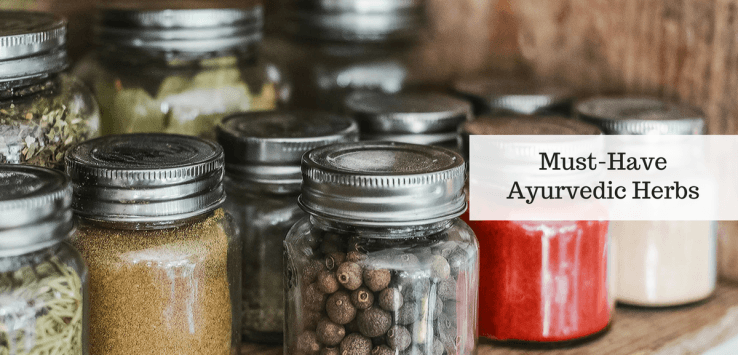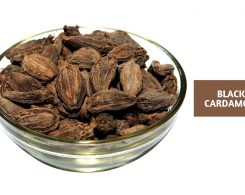- 2Shares
- 5 Must Have Ayurvedic Herbs In Every Kitchen
- 1. Tulsi a.k.a Holy Basil
- 2. Ashwagandha
- 3. Turmeric
- 4. Aloe Vera
- 5. Neem a.k.a Margosa
Herbs are far more powerful than most people realise. Being packed with medicinal properties, these versatile plants form a vital part of the Ayurvedic system. More and more modern studies confirm their benefits for the body and mind. The best part? When taking herbs, you’re exposed to zero artificial chemicals. Including them in your diet is one of the simplest ways you can use them to boost your health quotient. Here are 5 Ayurvedic herbs we reckon every kitchen should have.
5 Must Have Ayurvedic Herbs In Every Kitchen
1. Tulsi a.k.a Holy Basil
Tulsi has such potent healing qualities that it gained the status of a sacred plant in ancient India. This fragrant herb is easy to use and wonderfully soothing for the soul.
The Benefits of Tulsi:
- Drinking Tulsi tea has shown to reduce cortisol levels, making it an excellent stress busting tea.
- It helps the body flush out toxins.
- It fights infection and boosts immunity.
- When your chest is congested, Tulsi does the needful.
- This herb is considered to help those with asthma.
- Tulsi is also good for the stomach.
- It relieves headaches.
2. Ashwagandha
Ashwagandha goes by many names – Withania Somnifera, winter cherry, Indian ginseng, and even poison gooseberry! But it’s far from poison.
The Benefits of Ashwagandha:
- This herb warms the body, making it an important herb for Vata aggravation. It’s also good for those with high Kapha.
- It boosts strength and energy.
- It helps gain weight.
- Ashwagandha is an adaptanogen – it significantly helps fight the effects of stress on the body and mind.
- This herb relaxes the nerves and is therefore great for improving sleep.
- It helps fight off infection.
- It increases libido and sexual stamina.
3. Turmeric
The golden spice of Ayurveda, turmeric is one of the most heavily researched herbs – primarily because it contains curcumin, a compound with strong healing properties.
The Benefits of Turmeric:
- It has a balancing effect on all three doshas.
- It improves digestive health.
- Turmeric relaxes the nervous system, thus busting stress.
- It promotes better sleep.
- Studies find that it has powerful inflammation fighting abilities. It can be helpful in treating arthritis.
- It relieves pain and accelerates wound healing.
- This herb fights infection and boosts immunity too.
- It’s an excellent remedy for cold and cough – especially when mixed with honey and ginger.
More about turmeric.
4. Aloe Vera
Aloe Vera is among the most popular herbs on the plant – and for good reason. It has a range of benefits for the skin as well as the rest of your body.
The Benefits of Aloe Vera:
- This herb is widely known to soothe skin irritation and mild burns.
- Its juice can treat acne, reduce blemishes, and improve overall skin quality.
- It moisturises the skin and scalp.
- It reduces inflammation on the skin and in the body.
- This herb reduces excess heat (Pitta dosha).
- Aloe Vera relieves issues like flatulence and constipation.
- It provides the body with antioxidants.
- It also boosts immunity.
5. Neem a.k.a Margosa
Last on our list of Ayurvedic herbs is Neem. Hundreds of medicinal formulations contain this mighty plant as a central ingredient.
The Benefits of Neem:
- This herb has a cooling effect on the body as well as mind.
- Neem purifies the blood.
- It also improves blood circulation.
- It disinfects and clears the skin, making it a great remedy for acne, dandruff, fungal infections, as well as wounds.
- Neem is a great tonic for the immune system.
- It reduces inflammation in the body.
- It may reduce blood sugar – but we need more studies to prove this.
Note that though natural, herbs have can have serious side effects too – especially if you’re taking medication and suffering from a disease. So before using anything as a medicine, always consult your doctor. This article is solely for the purpose of information; please do not substitute it for medical advice.






Leave a Reply